Aluminium is ductile. Aluminum foil can be rolled to only 0.007 mm thickness, but will still be completely impermeable and lets neither light, aroma nor taste substances in or out. The metal itself forms a protective oxide coating and is highly corrosion resistant. Different types of surface treatment can further improve these properties

As a skin for heat-insulating and incombustible materials to provide high performance insulation for pipe work and ducting
As a basis for adhesive tape used to secure laminated materials
In electrical cables, for long-term insulation against moisture and corrosive elements
As an insulator against the magnetic and radio frequency emissions associated with electrical cables
As a sheath for fiber-optic cables, to enable testing of the integrity of cable links and secure a long shelf life
In fire walls for vehicles and fireproof doors and building panels to stop access to the oxygen required to support flames
As electrode layer in batteries
If you’re cooking with a grill or an oven, you can wrap meat, vegetables, and other dishes in aluminum foil to retain moisture and flavor. The added bonus of cooking with aluminum foil is that you can simply throw away the foil afterward – no pots or pans to scrub.
Grill fish or vegetables. Add seasonings to raw fish or vegetables, and then wrap securely. Place on the hot grill. When the dish is done cooking: open the foil, put the fish or vegetables on a platter, and throw away the foil. The convenience of this method is that there is nothing else to clean up.
Roast a turkey. Place the raw turkey on a baking pan, and tent it with aluminum foil. This will retain the juices in the turkey while baking, so as to cook completely through without burning. Remove the tent for the last hour of roasting, so that the turkey skin gets browned and crisp.



